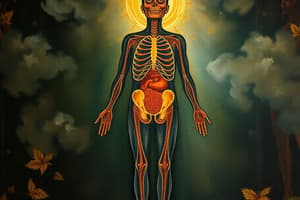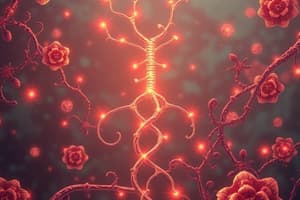Podcast
Questions and Answers
What initiates the second-messenger system in the hormone action process?
What initiates the second-messenger system in the hormone action process?
- Production of new proteins
- Activation of a DNA molecule
- Hormone-receptor complex formation
- Binding of the hormone to a membrane receptor (correct)
Which molecule is considered the second messenger in the hormone action process?
Which molecule is considered the second messenger in the hormone action process?
- mRNA
- DNA
- Cyclic AMP (cAMP) (correct)
- Protein
During the direct gene activation process, what is the role of the hormone-receptor complex?
During the direct gene activation process, what is the role of the hormone-receptor complex?
- To produce enzymes for the second-messenger system
- To enter the nucleus and interact with DNA (correct)
- To bind to the cytoplasm directly
- To deactivate other hormones
What is the primary role of the enzyme activated in the second-messenger system?
What is the primary role of the enzyme activated in the second-messenger system?
What is the sequence of events in the second-messenger system starting from hormone binding?
What is the sequence of events in the second-messenger system starting from hormone binding?
What initiates hormonal stimuli in the endocrine system?
What initiates hormonal stimuli in the endocrine system?
Which gland is stimulated by hormones from the hypothalamus?
Which gland is stimulated by hormones from the hypothalamus?
What type of stimuli is involved when blood levels of calcium trigger hormone release?
What type of stimuli is involved when blood levels of calcium trigger hormone release?
Which hormones are specifically mentioned as being produced in response to blood calcium levels?
Which hormones are specifically mentioned as being produced in response to blood calcium levels?
What is indicated by the term 'humoral' in the context of hormone release?
What is indicated by the term 'humoral' in the context of hormone release?
Which of the following hormones is released in response to changing blood glucose levels?
Which of the following hormones is released in response to changing blood glucose levels?
When the anterior pituitary gland secretes hormones, what is the typical effect?
When the anterior pituitary gland secretes hormones, what is the typical effect?
Which of the following is a characteristic of hormonal stimuli?
Which of the following is a characteristic of hormonal stimuli?
What is the primary effect of insulin on blood glucose levels?
What is the primary effect of insulin on blood glucose levels?
Under what condition is glucagon released?
Under what condition is glucagon released?
What mechanism regulates blood glucose levels through pancreatic hormones?
What mechanism regulates blood glucose levels through pancreatic hormones?
Which of the following hormones is responsible for promoting glucose uptake by body cells?
Which of the following hormones is responsible for promoting glucose uptake by body cells?
What happens to blood glucose levels after insulin is released?
What happens to blood glucose levels after insulin is released?
What is the primary function of mineralocorticoids produced in the adrenal cortex?
What is the primary function of mineralocorticoids produced in the adrenal cortex?
Which of the following correctly describes a stimulus for aldosterone release?
Which of the following correctly describes a stimulus for aldosterone release?
What is the role of the kidney in relation to aldosterone?
What is the role of the kidney in relation to aldosterone?
Which condition would most likely inhibit the production of aldosterone?
Which condition would most likely inhibit the production of aldosterone?
What hormone primarily stimulates the release of aldosterone?
What hormone primarily stimulates the release of aldosterone?
In which part of the adrenal gland is aldosterone produced?
In which part of the adrenal gland is aldosterone produced?
Which substance is NOT a factor in stimulating aldosterone release?
Which substance is NOT a factor in stimulating aldosterone release?
What major effect does aldosterone have on the body?
What major effect does aldosterone have on the body?
What triggers the release of corticotropin-releasing hormone from the hypothalamus?
What triggers the release of corticotropin-releasing hormone from the hypothalamus?
What hormone released from the anterior pituitary gland increases blood pressure or blood volume?
What hormone released from the anterior pituitary gland increases blood pressure or blood volume?
What is the primary effect of aldosterone secretion on the kidneys?
What is the primary effect of aldosterone secretion on the kidneys?
Which of the following has an inhibitory effect on the secretion of mineralocorticoids?
Which of the following has an inhibitory effect on the secretion of mineralocorticoids?
What physiological condition leads to increased renin secretion?
What physiological condition leads to increased renin secretion?
What mechanism is primarily responsible for the indirect stimulating effect of angiotensin II?
What mechanism is primarily responsible for the indirect stimulating effect of angiotensin II?
Which factor will decrease the secretion of corticotropin-releasing hormone?
Which factor will decrease the secretion of corticotropin-releasing hormone?
What is the consequence of increased absorption of Na+ in kidney tubules?
What is the consequence of increased absorption of Na+ in kidney tubules?
How does increased K+ levels in blood primarily affect the hypothalamus?
How does increased K+ levels in blood primarily affect the hypothalamus?
What role does renin play in the regulation of blood pressure?
What role does renin play in the regulation of blood pressure?
Flashcards are hidden until you start studying
Study Notes
Hormone Action
- Hormones can stimulate target cells by direct gene activation or a second-messenger system.
- Direct gene activation involves a hormone entering a target cell and binding to a receptor protein in the cytoplasm or nucleus.
- The hormone-receptor complex then enters the nucleus and binds to DNA, stimulating the synthesis of a specific protein.
- In the second-messenger system, the hormone binds to a membrane receptor on the target cell, activating an enzyme that catalyzes a reaction to produce a second-messenger molecule (e.g., cAMP).
- The second messenger then oversees additional intracellular changes to promote a specific response in the target cell.
Stimuli for Control of Hormone Release
- Hormone release is regulated by three primary mechanisms: hormonal, humoral, and neural stimuli.
- Hormonal stimuli involve the activation of endocrine organs by other hormones. For example, the hypothalamus secretes hormones that stimulate the anterior pituitary to release its hormones.
- Humoral stimuli involve changes in blood levels of certain ions and nutrients, such as parathyroid hormone and calcitonin in response to blood calcium fluctuations or insulin in response to blood glucose levels.
- Neural stimuli involve neurons directly stimulating hormone release. For example, sympathetic nervous system neurons stimulate the adrenal medulla to release epinephrine and norepinephrine.
Adrenal Glands
- The adrenal glands consist of an outer cortex and an inner medulla.
- The adrenal cortex produces three classes of steroid hormones: mineralocorticoids, glucocorticoids, and sex hormones.
- Mineralocorticoids, primarily aldosterone, regulate mineral content in the blood (particularly sodium and potassium ions), influencing water and electrolyte balance.
- The release of aldosterone is stimulated by humoral factors (low sodium or high potassium levels), hormonal factors (ACTH), and renin-angiotensin II in response to low blood pressure.
- Aldosterone secretion is inhibited by atrial natriuretic peptide (ANP), which is released by the heart when blood pressure is high.
Pancreatic Islets
- The pancreatic islets contain alpha cells that produce glucagon and beta cells that produce insulin.
- Insulin is released when blood glucose levels are high, increasing glucose uptake and metabolism by body cells. The effect of insulin is hypoglycemic.
- Glucagon is released when blood glucose levels are low, stimulating the liver to release glucose into the blood, thus increasing blood glucose levels.
Studying That Suits You
Use AI to generate personalized quizzes and flashcards to suit your learning preferences.




